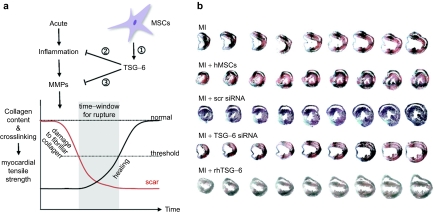Figure 1.
Anti-inflammatory effects of human mesenchymal stem/stromal cells (hMSCs) activated to secrete tumor necrosis factor-α (TNF-α) stimulated gene/protein 6 (TSG-6) in a mouse model of myocardial infarction. (a) Schematic diagram. (1) hMSCs injected intravenously were trapped in the lungs and activated to secrete TSG-6 (TNF-α stimulated gene/protein 6). (2) The TSG-6 decreased the normal but excessive inflammatory response that damages the heart. (3) The TSG-6 probably further decreased proteolytic damage to the heart by inhibiting matrix metalloproteinases (MMPs) (see refs. 42,43,46). (b) Selected sections through heart. Each heart was cut from apex to base into over 400 sequential 5 µm sections. Every twentieth section is shown. Either hMSCs or hMSCs transduced with the scrambled siRNA (scr siRNA) decreased the size of myocardial infarction examined 3 weeks later. However, hMSCs with an siRNA knockdown of the TSG-6 gene (TSG-6 siRNA) had no effect on infarct size. Intravenous infusion of 100 µg of recombinant human (rh) TSG-6 immediately following the surgery and at 24 hour also decreased infarct size. (a) Reproduced with modifications and with permission from Elsevier.46 (b) Reprinted with permission from Elsevier.25

